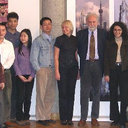Dichloromethane Extracts of Geranium Koreanum Kom. Alleviates Esophagus Damage in Acute Reflux Esophagitis-Induced Rats by Anti-Inflammatory Activities.
Fjalë kyçe
Abstrakt
Reflux esophagitis (RE) is a gastrointestinal disease caused by the reflux of gastric acid and stomach contents, and it leads to esophageal damage. Therefore, it is necessary to study the improvement of esophageal damage on a RE-induced model. The present study was accomplished to demonstrate the protective effects of a dichloromethane fraction of Geranium koreanum (DGK) plant on esophageal damage in an acute RE rat model. First, we examined the potential of anti-inflammatory effects of various fractions measured by cell cytotoxicity, morphological changes and nitric oxide (NO) production on lipopolysaccharide (LPS)-induced Raw 264.7 macrophage cells. Then, to evaluate the protective effects on RE, rats were partitioned into the following groups: normal control, RE-induced control and RE rats pre-treated with DGK 100 and 200 mg/kg body weight. The esophageal mucosal ulcer ratio was measured by the Image J program and histological changes were examined using a hematoxylin and eosin staining of the esophageal mucosa. The expression of pro-inflammatory proteins, cytokines and tight junction proteins involved in the esophageal mucosal damage were investigated using Western blotting and an enzyme-linked immunosorbent assay (ELISA) kit with esophagus tissue. DGK chemical profile and phenolic contents were analyzed by liquid chromatography-mass spectrometry (LC-MS/MS). The results showed that DGK exhibited anti-inflammatory effects against LPS-stimulated cells by significantly inhibiting NO production. Additionally, the results in vivo showed that improvement effects of DGK on esophageal mucosal damage. The expression of inflammatory proteins involved in nuclear factor κB (NF-κB) signaling pathways and tight junction protein (claudin-4 and -5) were significantly decreased in esophageal mucosa. We found the potential of DGK as source of replacement therapy products for inflammatory and RE disease.


